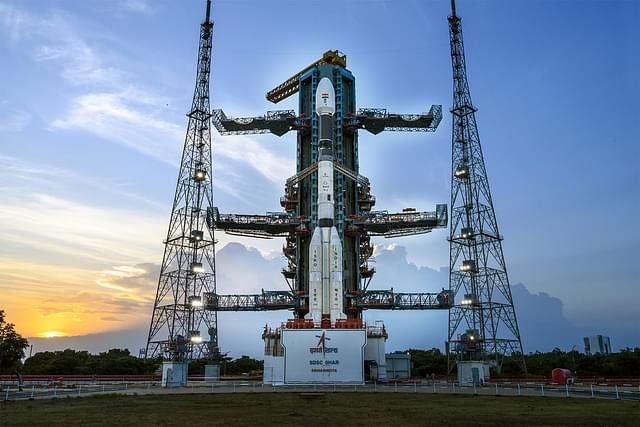Context
Space Sector Reforms Take Effect — Entrepreneurs Come Forward For Space Activities

ISRO (East Mojo)
The opening up of the space sector to private players is delivering results, as around 60 startups have registered with ISRO for space exploration.
Context: Union Minister Jitendra Singh revealed this after inaugurating the 'ISRO System for Safe & Sustainable Space Operation and Management' (IS4OM) in Bengaluru on 11 July.
Singh said these startups are working on proposals varying from space debris, nano-satellites, launch vehicles, ground systems, and research.
Quite a few startups are said to be working on space debris management.
Modi has broken "many taboos of the past" by allowing private players in the space sector through ISRO's commercial arm, NewSpace India Limited (NSIL), he added.
What's NSIL? It's a relatively new central public sector enterprise under the administrative control of the Department of Space.
It was set up on 6 March 2019 to meet the ever-increasing demands of the Indian space programme.
It's meant to commercially exploit the R&D work pursued at ISRO to cater to the rapidly growing global space market.
NSIL is the commercial arm of ISRO and is tasked with functions such as the production of satellites and launch vehicles, marketing of space-based services, and transfer of domestic space technology.
IN-SPACe complements NSIL: PM Narendra Modi inaugurated the headquarters of the Indian National Space Promotion and Authorisation Centre (IN-SPACe) at Bopal in Ahmedabad, Gujarat, on 10 June.
IN-SPACe was approved by the Union cabinet in June 2020 and was hailed as among the top space sector reforms in India.
It's the nodal agency that will allow space activities and use of Department of Space-owned facilities by non-government private entities and ensure greater private participation in the sector.
It will promote and support the participation of the private sector in the entire range of space activities, including planetary exploration missions.
“When the strength of government space institutions and the passion of India’s private sector will meet, not even the sky will be the limit,” PM Modi said at the recent IN-SPACe HQ inauguration.
India's private space potential: Despite having laid a strong foundation for space R&D over several decades, India has potential to do much more.
Speaking at the Bengaluru Tech Summit last year, IN-SPACe chairperson Pawan K Goenka said, “Space economy globally is about $400 billion, out of which India’s share is just about 2 per cent."
“This is why, two years ago, the Government of India took a major decision to open the space sector to private enterprises" he added.
Goenka highlighted AI, machine learning, materials, design and manufacturing of rocket launchers, satellites, and payloads, and ground stations as areas where India can make advancements.
ISRO benefits from private participation as its hands are now freed to pursue more core R&D activities, new technologies, exploration missions, and the human spaceflight programme.
Aatmanirbharta in space: India's self-reliance programme is encompassing several areas, and space is a key sphere. The private sector seems on its way to sharing in India's space workload at all levels.
Support Swarajya's 50 Ground Reports Project & Sponsor A Story
Every general election Swarajya does a 50 ground reports project.
Aimed only at serious readers and those who appreciate the nuances of political undercurrents, the project provides a sense of India's electoral landscape. As you know, these reports are produced after considerable investment of travel, time and effort on the ground.
This time too we've kicked off the project in style and have covered over 30 constituencies already. If you're someone who appreciates such work and have enjoyed our coverage please consider sponsoring a ground report for just Rs 2999 to Rs 19,999 - it goes a long way in helping us produce more quality reportage.
You can also back this project by becoming a subscriber for as little as Rs 999 - so do click on this links and choose a plan that suits you and back us.
Click below to contribute.
Latest